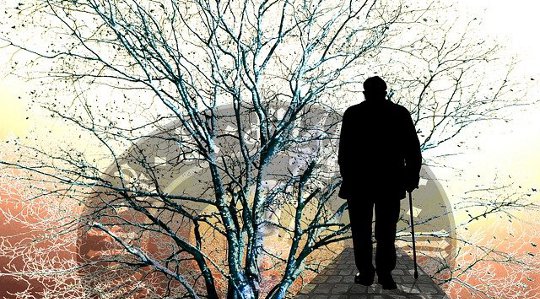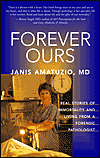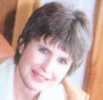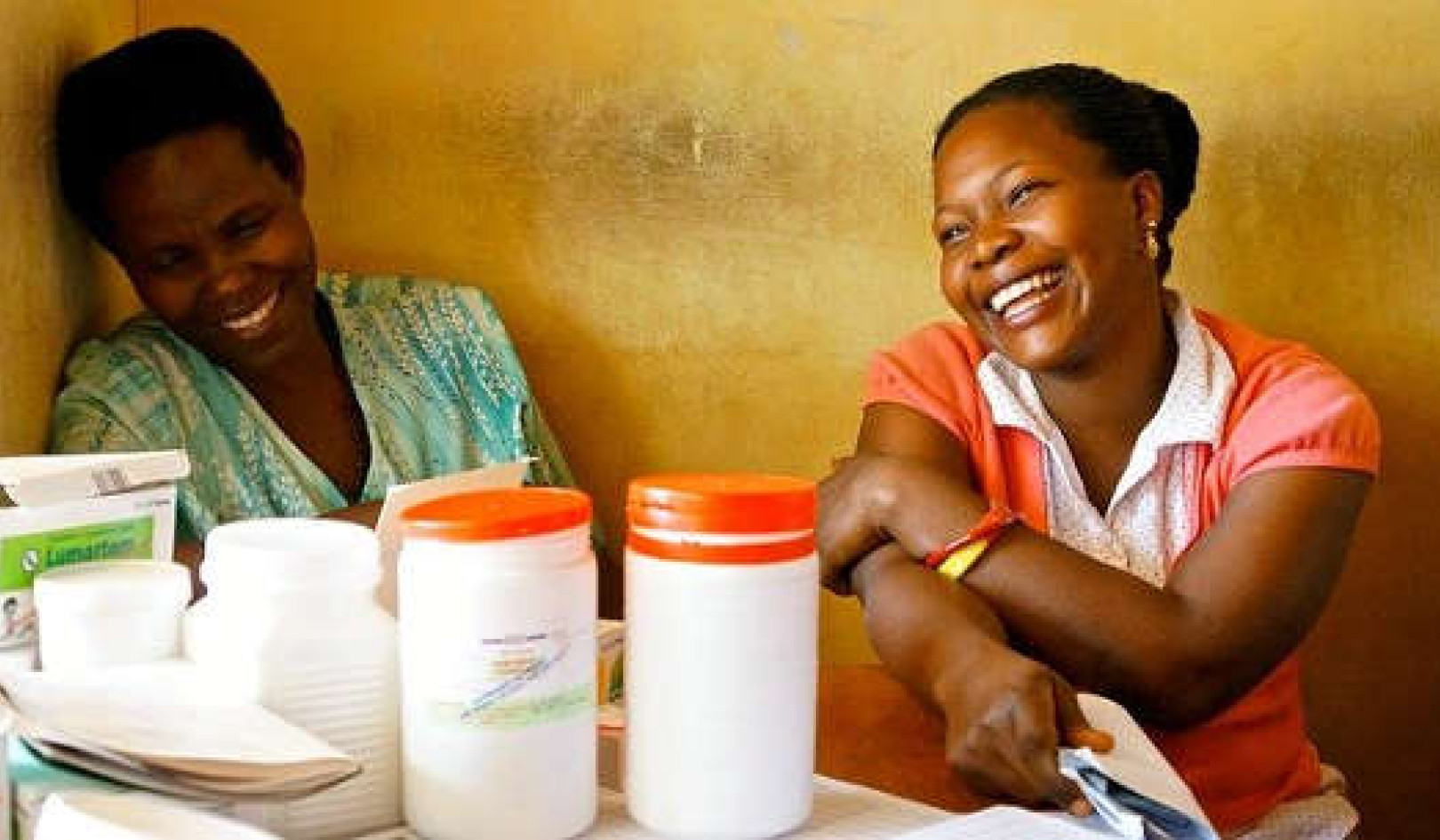
I can see clearly now, the rain is gone
I can see all obstacles in my way
Gone are the dark clouds that had me blind
Gonna be a bright, bright sunshiny day....
-- JOHNNY NASH
The night after my beloved grandmother died, twenty-eight years ago, I was awakened in the stillness of the early-morning hours when I became aware of her presence at the foot of my bed. She had been diagnosed with breast cancer four years earlier, at the age of eighty-five. She had died in Seattle while visiting her son; my mother had flown out to be with her as her condition had worsened. Dad had told us of her death, and I was devastated.
My grandmother and I were very close. When I was a young child, she had lived with my mother and me in California while my father was serving in the Korean conflict. Back then, she was my playmate and sandbox companion; in adulthood she had been my closest friend and confidante.
I Am Just Fine and I Love You
I sat up in bed, not at all startled but completely overjoyed. Her presence was familiar, graceful, and reassuring. The evening before, I had sobbed and wept, thinking I would never see her again. At that moment, she just glowed and looked stunningly beautiful, calm, and younger than before. With a look of supreme Irish knowing, and without even moving her lips, she spoke to me: "Janis, tell your mother that I am just fine. And always remember how much I love you."
Her presence stayed with me until I fell back to sleep. I awakened with a deep sense of peacefulness and a new awareness. In some ways I have never been the same again. I know in my heart that my grandmother lives and that our love is forever.
This beautiful, intimate experience in the midst of such shattering grief comforted my heart in a way I couldn't even explain. It seemed to belong to another dimension deep within me. It spoke to my soul, and I somehow recognized that which had been forgotten and felt comforted. This knowing has caused a subtle shift in my perspective and a growing awareness of what heals and comforts.
Nothing Prepares Us For The Death of a Loved One
When faced with the death or serious illness of a loved one — whether a parent, son or daughter, spouse, or long-time friend — we are almost always shaken, often to the core. When the death is unexpected or sudden, our grief, anger, and confusion can be overwhelming. It can feel as if our values or belief systems have failed, leaving us unprepared to go on.
I remember a woman who came to my office to obtain a copy of the autopsy report on her father — he had died in a car crash. After I answered her questions, she told me that her husband had died several years earlier of heart disease, leaving her alone to care for their seven-year-old son. She told me how bitter and angry with life she felt. "I feel so alone, so abandoned," she said tearfully. "I never knew it would be so hard. Nothing ever prepared me for this."
Everyone has heard these words or felt such pain at some point in their lives. And we all know that with time, our grief will be tempered. But what actually heals? What helps us to find the wisdom to live? The great masters of our time have taught us that our grief honors our love. We are designed to grieve, but not for long. Ultimately, we must trust life and love and hope.
Maybe our grieving hearts echo our bodies' wisdom. Our grief is like an intensely painful wound: it gets our full and immediate attention. The physical wound must be tended and cleaned and the bleeding stopped. Only then can it be bandaged and the pain relieved. Whether a wounded hand or a wounded heart, the healing comes from within. In the process, time passes, priorities shift, and life proceeds. However, life is different, for we have changed.
But How Have We Changed?
A man came to see me after his wife had died in the ICU following a long and difficult struggle with cancer. He looked bedraggled and depressed. After I explained the autopsy findings and hospital course, he sat there, folded his hands over his eyes, and wept.
"She was the love of my life; I lived for her!" he said. "We met after my first wife died. I sold my house and bought a motor home, and we traveled the continent from the Canadian Rockies to the Yucatan Peninsula. It was the dream of a lifetime to have that time with her. I had never, ever been so happy! And now she is gone. I have no reason to go on," he sobbed.
For a reason unknown to me, I suddenly said, "Do you know how lucky you are?" He looked at me suspiciously. "I talk with so many people about the death of their loved ones, but I can't remember when anyone described such a love to me with such passion and intensity. I think some people wait a whole lifetime to find what you did. You were loved, and you loved grandly. Somehow I have to believe that your life is richer because of that." I could see that something had changed in his eyes.
We walked out of the office together and paused at the stairwell before I headed down the hall to the morgue.
"Thank you, Doctor, for everything." He paused. "I had forgotten how lucky I am to have loved like that. And just how much I am loved. I can live with that. I'll remember now; thank you," he said with a smile, then turned and walked up the stairway.
Common Threads
It's been said that a lifetime can be compared to a tapestry, each experience weaving in a new thread. Perhaps, in time, grief strengthens and hones us. Much like a resilient hidden thread, it adds strength and fullness to our lives. If we didn't love, we wouldn't grieve.
I carry these messages with me and try to apply them to my life. I have slowly come to recognize a few common threads. Even so, I am keenly aware that the tapestry, like each person's life, is in the hands of its weaver.
A death or the discovery of a serious illness jars us out of our daily routines. We stop all that we are doing. Other than death and illness, there are few things in life that temporarily relieve us of obligations. Grief seems to have that effect; it stops us and, at times, numbs us. But when sorrow has exhausted us and tears have emptied us, stillness overtakes us.
When the mind becomes quiet, the heart can feel. Maybe then our loved ones dance into our awareness and our dreams and delight us. Their presence comforts and fills us with reassurances of their love. Such experiences change lives and heal hearts. Maybe stillness is one of the threads that connect us.
The Thread Of Love
A death or serious illness reminds us that all beginnings have an ending, that each interaction with one another could be our last. This reminder has a way of cutting through the nonessential stuff of life. It may change what we say or what we do.
Maybe, like the young woman whose husband was killed in a construction accident, we will remember to kiss our loved ones goodbye. Each moment becomes a gift, and time becomes sacred. This remembering may cause us to treat one another more honestly, gently, and deliberately.
It seems there is nothing that love cannot heal, and in the presence of love, there is life, always and forever. Love seems to be the thread that connects all of what is seen with our eyes and felt in our hearts. Ultimately, it must be what connects us with eternity.
The Thread Of Hope
The experiences I have recorded here fill me with a sense of hope. Perhaps when we stop dismissing our awareness of a presence or a synchronicity, we begin to glimpse something more. Many times, as I have begun a postmortem examination, I have observed how quickly the body disintegrates after death. I marvel at the strength of the life force that sustained it. I marvel at the life force, God, and feel as though there is so much more to know.
Occasionally I catch a glimpse of what heals — the awareness of our loved ones in the whisper of the wind or in the soft beauty of a star-gleaming night, or gently dancing into our dreams as we sleep. Why does awareness of these connections heal? Perhaps because we must stop to absorb them and be still to observe them. Then we can remember that we are not alone, that we are dearly loved, and that all is well.
I am filled with heartfelt appreciation for those who, in the midst of their grief, have spoken of their treasured experiences. I feel honored to share their stories with others. Many times I have wondered if I could move past grief as well as those who I've cared for have done. When something happens to you personally, it hurts deeply. Part of your life is changed forever.
When my mother was urgently admitted to the hospital for heart disease, I was very worried for her welfare and that of my eighty-three-year-old father. They had been married for more than fifty-five years; my physician father appeared knowledgeable and fragile at the same time. One evening at home during that time, I sat down to rest and reflect on the day's events. My thoughts turned to worry and fear as the fatigue of the day washed over me.
I sat at my desk to write, but no words would come. So I began to pray. Almost immediately, and somewhat unexpectedly, my head filled with the following words, spoken with such infinite tenderness that tears washed down my cheeks.
"Janis, I love you so. Don't worry, your parents will be fine. At the moments of their deaths, I will wrap them up in my love and yours, and they will be forever ours."
The comfort, amazement, and relief I felt were overwhelming. I knew instinctively that these words were true and would last me a lifetime.
It is my fondest hope that the wisdom shared in this book will comfort and remind us of what really heals: knowing we are loved, knowing we are never alone, and knowing our loved ones are forever ours.
Reprinted with permission of the publisher,
New World Library. ©2002. www.newworldlibrary.com
Article Source:
Forever Ours: Real Stories of Immortality and Living from a Forensic Pathologist
by Janis Amatuzio, M.D.
 Forensic pathologist Janis Amatuzio first began recording the stories told to her by patients, police officers, and other doctors because she felt that no one spoke for the dead. She believed the real experience of death - namely, the spiritual and otherworldly experiences of those near death and their loved ones - was ignored by the medical professionals, who thought of death as simply the cessation of breath. She knew there was more. From the first experience of a patient in her care dying to the miraculous "appearances" of loved ones after death, she began recording these experiences, knowing that they would bring comfort to anyone who has suffered the loss of someone they love. Written by a scientist in approachable, nonjudgmental language for anyone who has lost someone they love, this book offers stories that can't be explained in purely physical terms.
Forensic pathologist Janis Amatuzio first began recording the stories told to her by patients, police officers, and other doctors because she felt that no one spoke for the dead. She believed the real experience of death - namely, the spiritual and otherworldly experiences of those near death and their loved ones - was ignored by the medical professionals, who thought of death as simply the cessation of breath. She knew there was more. From the first experience of a patient in her care dying to the miraculous "appearances" of loved ones after death, she began recording these experiences, knowing that they would bring comfort to anyone who has suffered the loss of someone they love. Written by a scientist in approachable, nonjudgmental language for anyone who has lost someone they love, this book offers stories that can't be explained in purely physical terms.
Click here for more info and/or to order this book. Also available as a Kindle edition, an Audiobook, and an Audio CD.
About the Author
Janis Amatuzio, M.D., is the founder of Midwest Forensic Pathology, P.A., serving as coroner and a regional resource for counties in Minnesota and Wisconsin. Dr. Amatuzio is a dynamic speaker, a frequent guest in the media and author of numerous journal articles. She will be featured as an expert in a documentary series about women serial killers produced by the Discovery Channel in 2005. Dr. Amatuzio's website is: www.foreverours.com.



























